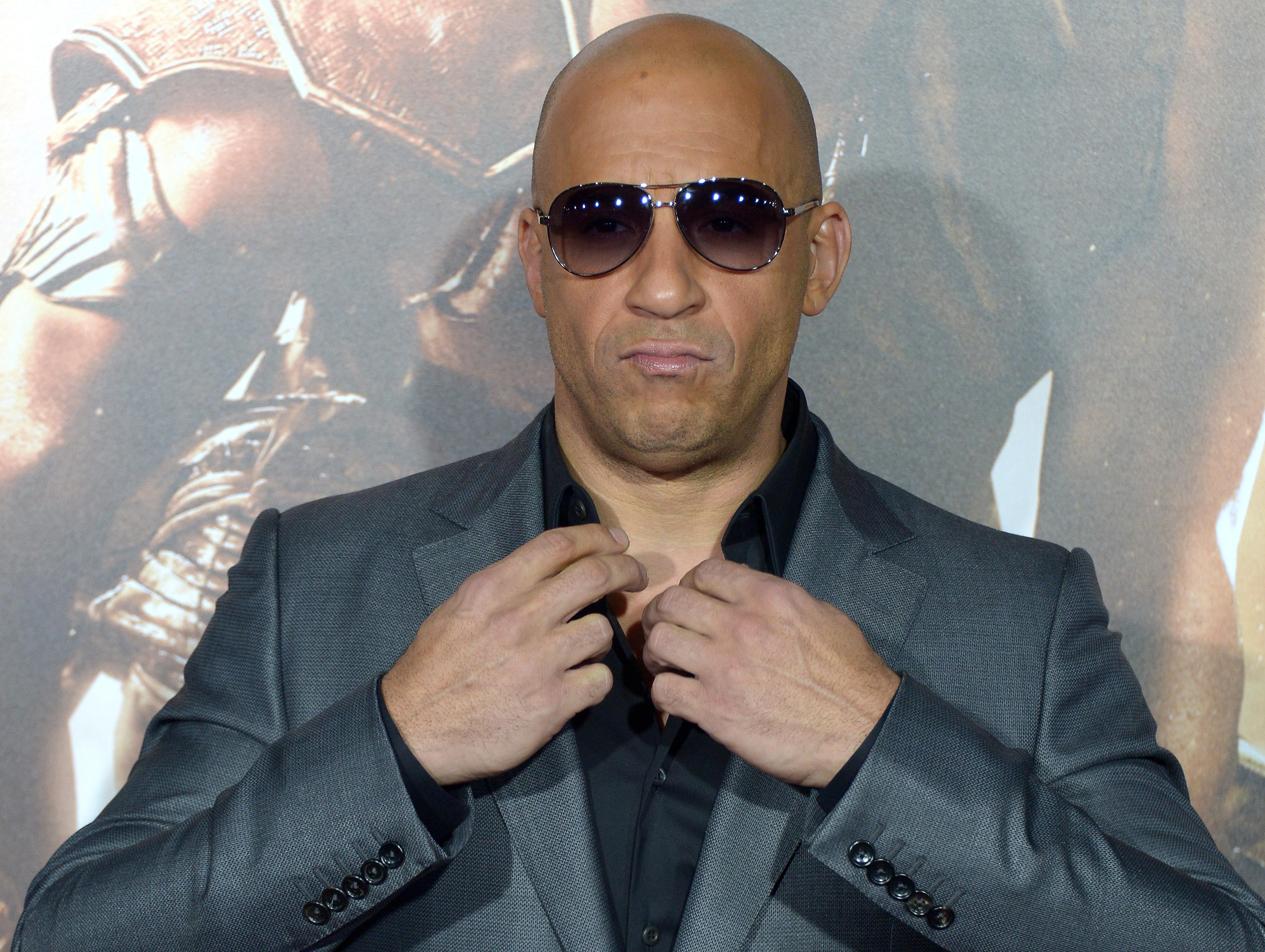Most people think of Vin Diesel as a cartoonishly muscle-laden, inarticulate, perhaps even anti-intellectual lunk. It’s all right there on the surface in the Fast and Furious series and the frequently-awful xXx, you might say. But scratch the surface and you’ll find a star who has a complicated relationship with the idea of hypermasculinity—an action hero who plays with his macho image in surprisingly thoughtful ways.
For someone with degrees in film and gender studies, I find myself defending Vin Diesel a lot. One of my very first conversations with my wife devolved into a rambling, testy soliloquy on the hidden complexity of Vin’s persona. Now, with the impending release of Furious 7 (the franchise is verging on Land Before Time–level staying power) and Diesel’s stunning guarantee that the film will win the Oscar for Best Picture, I’m more on the defensive than ever.
Diesel is not your standard “tough guy.” He is, first of all, a huge nerd. He’s not just an avid Dungeons & Dragons player; he wrote the foreword to the commemorative tome Thirty Years of Adventure: A Celebration of Dungeons & Dragons. He told Jimmy Fallon that the game inspired him to become an actor. He taught Judi Dench how to play. He’ll occasionally produce a critically-acclaimed, award-winning Xbox game. He made an animated film with the guy who created Aeon Flux. He loves Tolkien’s The Silmarillion. He’s spent most of his career desperately trying to make a movie about Hannibal’s failed conquest of Rome.
Diesel’s Hollywood career was launched with Multi-Facial, an artsy, semi-autobiographical short film that he wrote, directed, produced, and starred in. It’s an angry film that has Diesel’s character “Mike” transitioning seamlessly through a rainbow of ethnic and racial masculine stereotypes, from Italian and Latin American to black, as he tries to get work as a multi-racial, ethnically ambiguous actor in New York City. It’s simultaneously a bitter satire of Hollywood’s treatment of men of color and an advertisement for Diesel’s dramatic range and chameleon-like racial and ethnic code-switching, aimed at casting directors. Spielberg reportedly cast Diesel in Saving Private Ryan—as an Italian American—after seeing the film at Cannes.
Whether he’s rapping with impassioned verve, aping homophobic and misogynistic archetypes, or talking about watching his father perform in Raisin in the Sun, Diesel’s Mike vividly demonstrates philosopher Judith Butler’s theory that gender is performative: that we don’t have an essential gender identity hiding inside of us, invisibly guiding and scripting our behavior. Instead we produce the illusion of a stable identity by constantly and continually putting on a show, enacting behaviors that certify us as recognizably masculine or feminine.
Diesel continued to tweak norms and assumptions about masculinity in his first feature film, Strays, which he also wrote and produced. He plays Rick, a drug dealer and serial womanizer struggling to grow up and find meaning and direction in his life. Diesel uses the laconic, dissatisfied, perhaps-too-thoughtful-for-his-own-good Rick to undermine the quietly misogynistic, self-destructive tough guy masculinities of his friends.
This is Diesel’s indie-film assault on what sociologists call hegemonic masculinity—a style of acting, feeling, and being masculine that isn’t just socially dominant, but also seems attractive and hip. These young men’s sexual conquests, emotional unavailability, and fixation on musculature and sports typify a pattern of behavior that is often constructed as not just natural but laudable: impressive to other young men and appealing to women.
There’s a similar undercurrent of social critique in the Disney family comedy The Pacifier, Diesel’s answer to Kindergarten Cop (or the arguably best-forgotten Hulk Hogan vehicle Mr. Nanny), but the critique here is aimed at the widespread mischaracterization of Diesel as a heavily-muscled brute. In terms of masculinity politics, this film is Strays through the looking glass, in that Diesel epitomizes a grown-up hegemonic masculinity—in one especially memorable moment he even does one-armed push-ups and uses his laptop at the same time. The film deploys a boorish, physically repulsive and aggressive performance from Brad Garrett as a high school wrestling coach as a mechanism to underline Diesel’s appealing masculine pedigree. Sure, he’s macho, but he’s also kind of a super-dad, and his masculine bravado never tips into self-parody.
Diesel may shine brightest in Pitch Black, a cult classic sci-fi/horror mash-up that has spawned a universe of video games, short films, novelizations, and feature-length sequels. Diesel’s Richard Riddick, a character he created with writer/director David Twohy, is hard to categorize. Which masculine archetype are we watching: sadistic murderer, ruthlessly pragmatic survivor, or prototypical self-sacrificing movie hero? It’s hard to tell, even when the final credits roll, and Riddick doesn’t seem to know either. Diesel does, maybe, but he’s not telling. He’s content to deadpan dry one-liners, glisten with sweat, and swing unpredictably between sexualized menace and seduction.
Riddick is perhaps the last surviving member of a lost race. His eyes are expressionless and luminescent, like glowing marbles—he can see in the dark, just like the hordes of bloodthirsty aliens that stalk the cast throughout the film. Is he hunting the rest of the ship’s crew too, or is he their only hope? Is he more human or animal? After all, he has an unnerving tendency to sniff the air wafting off of people’s skin to learn about them. In a jaw-unhinging moment, he escapes from a set of handcuffs by calmly, methodically dislocating both of his shoulders.
Riddick seems to be the character Diesel has had the most control over: his production company has been significantly involved in the sequels, and his studio produces the video games. Like Mike in Multi-Facial, we can’t quite pin him down, whether it’s his race, his moral valence, or even his humanity. He’s fluid. His masculinity isn’t about essence, about unquestionably being a man under the surface. It’s about the mercurial shifts, about the openness to interpretation, about unsettling our sense of what’s appropriate and desirable. This is the masculinity lurking behind all of these supposedly big, dumb, loud movies that cause so many people to write Vin Diesel off.
